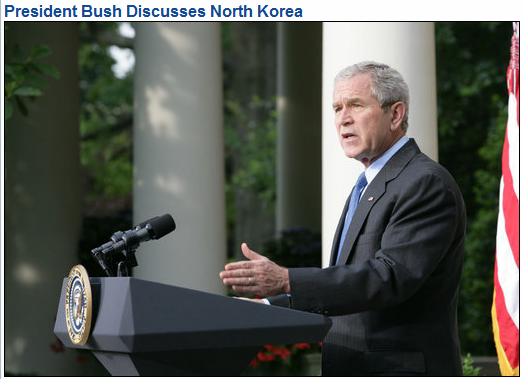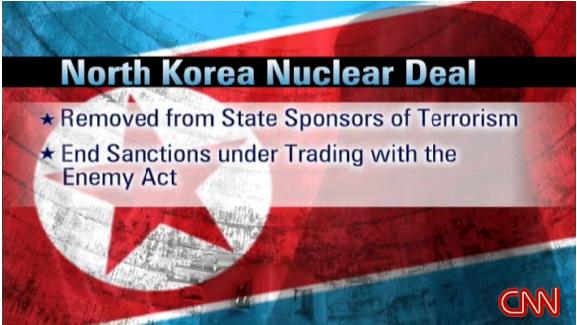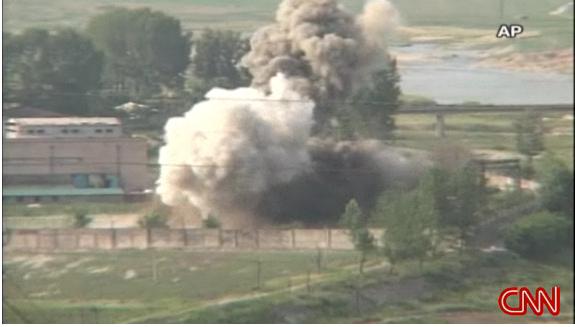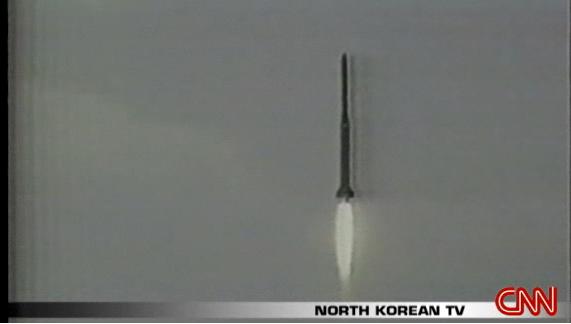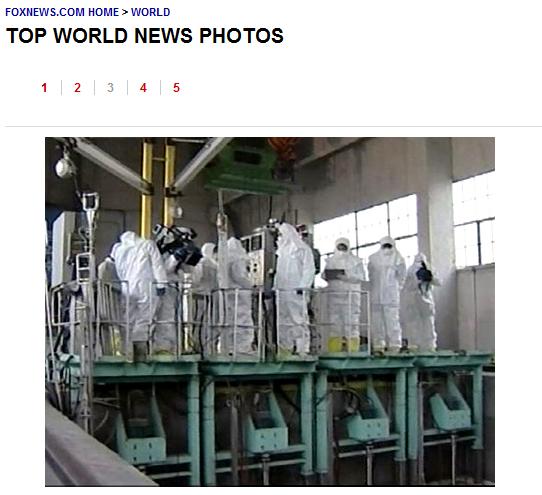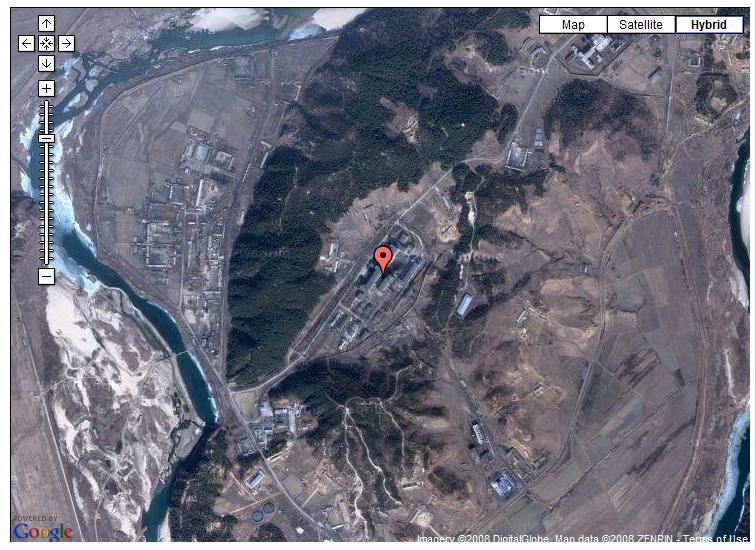PYONGYANG, North Korea (CNN) -- North Korea handed over its long-awaited
nuclear program declaration to officials from China on Thursday.
"The declaration says: 'We are not now engaged in any [uranium]
enrichment activities or [nuclear] proliferation activities and
will not engage in them in the future,'" U.S. National Security
Adviser Stephen Hadley said in Washington.
------------------------
In
February
22nd, 2008, the North Korea opened its main nuclear reactor to foreign
media for the first time Friday in a bid to show that it is complying
with a disarmament accord to disable the facility.
The world is concern about the North Korea's nuclear reactors.
----------------------------
President Goerge Bush discussed North Korea at the
Rose Gardent in June 26th, 2008
President George Bush will notifying Congress to rescind North Korea's
designation as a state sponsor of terror in 45 days and will work
through the six-party talks to develop a comprehensive and rigorous
verification protocol. And during this period, the United States
will carefully observe North Korea's actions -- and act accordingly.
See the following for detailed info:
President Bush Discusses North Korea
Rose Garden
For Immediate Release
Office of the Press Secretary
June 26, 2008
THE
PRESIDENT: Good morning. The policy of the United States is a Korean
Peninsula free of all nuclear weapons. This morning, we moved a
step closer to that goal, when North Korean officials submitted
a declaration of their nuclear programs to the Chinese government
as part of the six-party talks.
The United States has no illusions about the regime in Pyongyang.
We remain deeply concerned about North Korea's human rights abuses,
uranium enrichment activities, nuclear testing and proliferation,
ballistic missile programs, and the threat it continues to pose
to South Korea and its neighbors.
Yet we welcome today's development as one step in the multi-step
process laid out by the six-party talks between North Korea, China,
Japan, Russia, South Korea, and the United States.
Last year, North Korea pledged to disable its nuclear facilities.
North Korea has begun disabling its Yongbyon nuclear facility
-- which was being used to produce plutonium for nuclear weapons.
This work is being overseen by officials from the United States
and the IAEA. And to demonstrate its commitment, North Korea has
said it will destroy the cooling tower of the Yongbyon reactor
in front of international television cameras tomorrow.
Last year, North Korea also pledged to declare its nuclear activity.
With today's declaration, North Korea has begun describing its
plutonium-related activities. It's also provided other documents
related to its nuclear programs going back to 1986. It has promised
access to the reactor core and waste facilities at Yongbyon, as
well as personnel related to its nuclear program. All this information
will be essential to verifying that North Korea is ending its
nuclear programs and activities.
The six-party talks are based on a principle of "action for action."
So in keeping with the existing six-party agreements, the United
States is responding to North Korea's actions with two actions
of our own:
First, I'm issuing a proclamation that lifts the provisions of
the Trading with the Enemy Act with respect to North Korea.
And secondly, I am notifying Congress of my intent to rescind
North Korea's designation as a state sponsor of terror in 45 days.
The next 45 days will be an important period for North Korea to
show its seriousness of its cooperation. We will work through
the six-party talks to develop a comprehensive and rigorous verification
protocol. And during this period, the United States will carefully
observe North Korea's actions -- and act accordingly.
The two actions America is taking will have little impact on North
Korea's financial and diplomatic isolation. North Korea will remain
one of the most heavily sanctioned nations in the world. The sanctions
that North Korea faces for its human rights violations, its nuclear
test in 2006, and its weapons proliferation will all stay in effect.
And all United Nations Security Council sanctions will stay in
effect as well.
The six-party process has shed light on a number of issues of
serious concern to the United States and the international community.
To end its isolation, North Korea must address these concerns.
It must dismantle all of its nuclear facilities, give up its separated
plutonium, resolve outstanding questions on its highly enriched
uranium and proliferation activities, and end these activities
in a way that we can fully verify.
North Korea must also meet other obligations it has undertaken
in the six-party talks. The United States will never forget the
abduction of Japanese citizens by the North Koreans. We will continue
to closely cooperate and coordinate with Japan and press North
Korea to swiftly resolve the abduction issue.
This can be a moment of opportunity for North Korea. If North
Korea continues to make the right choices, it can repair its relationship
with the international community -- much as Libya has done over
the past few years. If North Korea makes the wrong choices, the
United States and our partners in the six-party talks will respond
accordingly. If they do not fully disclose and end their plutonium,
their enrichment, and their proliferation efforts and activities,
there will be further consequences.
Multilateral diplomacy is the best way to peacefully solve the
nuclear issue with North Korea. Today's developments show that
tough multilateral diplomacy can yield promising results. Yet
the diplomatic process is not an end in itself. Our ultimate goal
remains clear: a stable and peaceful Korean Peninsula, where people
are free from oppression, free from hunger and disease, and free
from nuclear weapons. The journey toward that goal remains long,
but today we have taken an important step in the right direction.
I'll take a couple of questions.
Mike.
Q Mr. President, thank you very much. After declaring them a member
of the "axis of evil," and then after that underground nuclear
tests that North Korea conducted in 2006, I'm wondering if you
ever doubted getting to this stage. And also, I'm wondering if
you have a message for the North Korean people.
THE PRESIDENT: I knew that the United States could not solve,
or begin to solve, this issue without partners at the table. In
order for diplomacy to be effective, there has to be leverage.
You have to have a -- there has to be consequential diplomacy.
And so I worked hard to get the Chinese and the South Koreans
and the Japanese and the Russians to join with us in sending a
concerted message to the North Koreans, and that is, that if you
promise and then fulfill your promises to dismantle your nuclear
programs, there's a better way forward for you and the people.
In other words, as I said in the statement, it's action for action.
It took a while for the North Koreans to take the six-party talks
seriously, and it also took there to be concerted messages from
people other than the United States saying that if you choose
not to respond positively there will be consequences.
And so I'm -- it's been a -- multilateral diplomacy is difficult
at times. It's hard to get people heading in the same direction,
and yet we were able to do so along -- our partners helped a lot,
don't get me wrong.
The message to the North Korean people is, is that we don't want
you to be hungry; we want you to have a better life; that our
concerns are for you, not against you; and that we have given
your leadership a way forward to have better relations with the
international community. This is a society that is regularly going
through famines. When I campaigned for President, I said we will
never use food as a diplomatic weapon. In North Korea, we have
been concerned that food shipments sometimes don't make it to
the people themselves -- in other words, the regime takes the
food for their own use.
So my message to the people is, is that we'll continue to care
for you and worry about you, and at the same time, pursue a Korean
Peninsula that's nuclear weapons free. And today we have taken
a step, and it's a very positive step, but there's more steps
to be done.
Deb.
Q Mr. President, what do you say to critics who claim that you've
accepted a watered-down declaration just to get something done
before you leave office? I mean, you said that it doesn't address
the uranium enrichment issue, and, of course, it doesn't address
what North Korea might have done to help Syria build its reactor.
THE PRESIDENT: Well, first, let me review where we have been.
In the past, we would provide benefits to the North Koreans in
the hope that they would fulfill a vague promise. In other words,
that's the way it was before I came into office.
Everybody was concerned about North Korea possessing a nuclear
weapon; everybody was concerned about the proliferation activities.
And yet the policy in the past was, here are some benefits for
you, and we hope that you respond. And, of course, we found they
weren't responding. And so our policy has changed, that says,
in return for positive action, in return for verifiable steps,
we will reduce penalties. And there are plenty of restrictions
still on North Korea.
And so my point is this, is that -- we'll see. They said they're
going to destroy parts of their plant in Yongbyon. That's a very
positive step -- after all, it's the plant that made plutonium.
They have said in their declarations, if you read their declarations
of September last year, they have said specifically what they
will do. And our policy, and the statement today, makes it clear
we will hold them to account for their promises. And when they
fulfill their promises, more restrictions will be eased. If they
don't fulfill their promises, more restrictions will be placed
on them. This is action for action. This is we will trust you
only to the extent that you fulfill your promises.
So I'm pleased with the progress. I'm under no illusions that
this is the first step; this isn't the end of the process, this
is the beginning of the process of action for action. And the
point I want to make to our fellow citizens is that we have worked
hard to put multilateral diplomacy in place, because the United
States sitting down with Kim Jong-il didn't work in the past.
Sitting alone at the table just didn't work.
Now, as I mentioned in my statement, there's a lot more verification
that needs to be done. I mentioned our concerns about enrichment.
We expect the North Korean regime to be forthcoming about their
programs. We talked about proliferation. We expect them to be
forthcoming about their proliferation activities and cease such
activities. I mentioned the fact that we're beginning to take
inventory, because of our access to the Yongbyon plant, about
what they have produced, and we expect them to be forthcoming
with what they have produced and the material itself.
So today I'm just talking about the first step of a multi-step
process. And I want to thank our partners at the six-party talks.
It's been incredibly helpful to achieve -- the beginnings of achieving
a vision of a nuclear-free Korean Peninsula to have the Chinese
to be as robustly involved as they are. You notice that the North
Koreans passed on their documents to the Chinese; after all, we're
all partners in the six-party talks.
The other thing I want to assure our friends in Japan is that
this process will not leave behind -- leave them behind on the
abduction issue. The United States takes the abduction issue very
seriously. We expect the North Koreans to solve this issue in
a positive way for the Japanese. There's a lot of folks in Japan
that are deeply concerned about what took place. I remember meeting
a mother of a child who was abducted by the North Koreans right
here in the Oval Office. It was a heart-wrenching moment to listen
to the mother talk about what it was like to lose her daughter.
And it is important for the Japanese people to know that the United
States will not abandon our strong ally and friend when it comes
to helping resolve that issue.
Today is a positive day; it's a positive step forward. There's
more work to be done, and we've got the process in place to get
it done in a verifiable way.
Thank you.
END 7:53 A.M. EDT
This
website provided by catch4all.com, Sandra Englund
|
